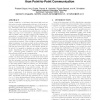Free Online Productivity Tools
i2Speak
i2Symbol
i2OCR
iTex2Img
iWeb2Print
iWeb2Shot
i2Type
iPdf2Split
iPdf2Merge
i2Bopomofo
i2Arabic
i2Style
i2Image
i2PDF
iLatex2Rtf
Sci2ools
125
click to vote
PODC
2009
ACM
2009
ACM
Brief announcement: global consistency can be easier than point-to-point communication
Global consistency or Byzantine Agreement (BA) and reliable point-to-point communication are two of the most important and well-studied problems in distributed computing. Informally, BA is about maintaining a consistent view of the world among all the non-faulty players in the presence of faults. In a synchronous network over n nodes of which up to any t are corrupted by a Byzantine adversary, BA is possible only if all pair point-to-point reliable communication is possible [Dol82, DDWY93]. Specifically, in the standard unauthenticated model, (2t + 1)-connectivity is necessary whereas in the authenticated setting (t + 1)connectivity is required. Thus, a folklore is that maintaining global consistency is at least as hard as the problem of all pair point-to-point communication. Equivalently, it is widely believed that protocols for BA over incomplete graphs exist only if it is possible to simulate an overlay-ed complete graph. Surprisingly, we show that the folklore is far from true -- ...
Pair Point-to-point Communication | Parallel Computing | PODC 2009 | Point-to-point Communication | Reliable Point-to-point Communication |
| Added | 25 Nov 2009 |
| Updated | 25 Nov 2009 |
| Type | Conference |
| Year | 2009 |
| Where | PODC |
| Authors | Prasant Gopal, Anuj Gupta, Pranav K. Vasishta, Piyush Bansal, Kannan Srinathan |
Comments (0)

